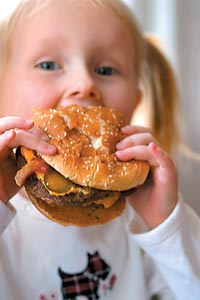 |
 |
|
A Resource for Athens Area Families
|
|
According to the American Diabetic Association, childhood obesity is on the rise. Twice as many children are obese today as compared to 20 years ago. Doctors are alarmed about the nation’s obesity epidemic particularly among children. More than one million teens are overweight and on their way to diabetes, high blood pressure and early heart attacks. Thousands of kids could face early death, some as young as in their twenties. Even toddlers are overeating in the United States. Often before their second birthday children have developed bad eating habits that plague the nation’s adults. Too much fat, sugar and salt and too little fruits and vegetables. A study of more than 3,000 infants and toddlers found a significant number are eating pizza, candy, French fries and soda pop. Children ages 1 to 2 only require 950 calories per day but the study shows that the intake for this age group averaged 1220 calories, an excess of nearly 30 percent. By 24 months, patterns were starting to emerge that were very similar to the same problematic American dietary patterns. The study done by Gerber Baby Products concluded that up to a third of these children under the age of 2 consume no fruits or vegetables and if they did have a vegetable, French fries was the most popular choice. Early diets strongly influence children’s food preferences and are generally shaped from ages 2 to 3. If children have soda, candy and French fries at such an early age it is going to be very challenging to introduce other food types to them later on. Statistics released by the American Diabetic association show that 90 percent of children with two overweight parents will be overweight adults. If an adolescent child needs to lose 30 pounds, unchecked it will become 60 to 80 by the time they are an adult. Fifty to 60 pounds unchecked could easily become 100 to 150 pounds. In November of last year, Dr. Richard H. Carmona, Surgeon General, urged pediatricians to do more to combat childhood obesity noting the statistics previously given. Healthy Weigh, an adult program developed by founder and director Jane Lane, developed a children’s program with help from a child psychologist and pediatric dietitian. The program is designed to help the whole family eat healthier and make better choices. Many overweight people have dreaded diseases that we have named Old Dieters Disease, AKA, ODD; the dieter mentality that causes so many problems. For example, “I am on a diet, but I blew if for today; I may as well eat all I want for the rest of the day and I will go back to may diet again tomorrow.” It’s the all or nothing attitude. “I am on a diet; my life is on hold; I’ve got to starve to death; I can’t eat out; I can’t eat anything I like and then when I can’t stand it anymore, I will eat everything I’ve missed.” Adults pass this dieter’s mentality on to their children. Often by the time a child seeks help he or she thinks that in order to lose weight, they will have to eat tuna fish and celery and cottage cheese. They think they have to give up all foods that they like. It’s that kind of thinking that makes it hard to get children interested in losing weight. Until a child is 12 or older they don’t really care about weight loss much. If a child says something at school or they are excluded from something because of their weight, for that moment perhaps they want to lose weight. However, when they get home into their normal environment and get comfortable, they eat the things they have eaten all their lives, even though those things have caused the problem. Change is difficult and this is why it takes a family’s input to be successful. When children enroll in a weight-loss program, most of them are on a gaining trend. The first objective is to get the child to stabilize their weight. Good weight-loss programs do not promote quick weight loss. Too little food can cause nutritional storages that actually prevent proper growth. Being too strict about what a child can eat can cause problems with his or her self-esteem and the feeding relationship. It can cause a child to be untruthful because they are so very sorry to disappoint their parents. They feel like failures and in many cases an unhealthy relationship develops that can actually contribute to the eating disorder. Many pediatric dieticians recommend no more than half a pound of weight loss per week. Parents should focus on praise and tasking, help their children learn to take responsibility for what they are doing, and learn to recognize how and what to do when eating out. Poor nutrition can affect the whole family – even if it does not result in obesity – and contributes to diabetes and heart disease. Eating healthy is better for everyone. Provided by Healthy Weigh 369-9668
|
. |
|
|
|
© 1998 - Athens Parent, Inc. All
rights reserved.
Reproduction in whole or in part without permission is prohibited. |
|
Send comments or suggestions to: webmaster@athensparent.com
|
 According to Dr. Sawyer Caplil, an associate professor of pediatric
endocrinology at the Yale University School of Medicine, children
6 and 7 years old have the manifestations of all of these diseases
together. The cluster of these conditions known as “metabolic
syndrome” at such an early age is a major concern for physicians.
They are screening children as young as 2 for cholesterol.
According to Dr. Sawyer Caplil, an associate professor of pediatric
endocrinology at the Yale University School of Medicine, children
6 and 7 years old have the manifestations of all of these diseases
together. The cluster of these conditions known as “metabolic
syndrome” at such an early age is a major concern for physicians.
They are screening children as young as 2 for cholesterol.
